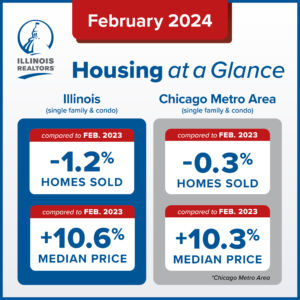In every election cycle in Illinois, there are a handful of municipalities which seek to become a “home rule” unit. Under the Illinois Constitution, a municipality that is not home rule is permitted to seek that status through voter approval in a referendum. (Municipalities that have a population of 25,000 or more are automatically granted that status.)
On the Feb. 2 ballot, there are three Illinois towns that are seeking to be home rule: Midlothian (Cook County), Hometown (Cook) and Sammons Point (Kankakee County).
In the past, REALTOR® associations have expressed concerns with several of the powers that are utilized by home rule municipalities. Such powers have included point-of-sale inspection of properties, unlimited ability to tax real property and a variety of regulations imposed on rental properties.
The Mainstreet Organization of REALTORS®, working with IAR’s Advocacy Program, will be informing voters in Midlothian and Hometown (with direct mail pieces) about these powers and the possible implications for real estate and property ownership.
The Kankakee County Association of REALTORS® will place an informational ad in a local newspaper which also informs voters in Sammons Point.
Some good news in this election cycle! IAR has learned of NO real estate transfer tax referenda in Illinois in the Feb. 2 election.
Under Illinois law, if a home rule municipality wants to impose a new transfer tax or increase an existing transfer tax, the municipality must get voter approval in a referendum. This law was passed by the Illinois General Assembly in 1996.
The Illinois Association of REALTORS® worked hard to get that law passed. Over the years (since the Constitutional enactment of home rule in 1970), REALTORS® have seen some abuses of home rule power in some municipalities. Here is a sampling of some of the more extreme abuses:
- In 1998, Highland Park enacted a $10,000 residential “teardown tax.” In 2005, Evanston passed a similar tax. In 2008, Highland Park considered increasing its tax to $25,000.
- With some pre-sale home inspection ordinances, the municipalities will require an escrow deposit from buyers of “AS IS” properties that have totaled as high as $40,000.
- Impact fees in several municipalities are imposed for libraries, police cars, fire protection equipment and “public art.” No statutory authority exists for these fees but these municipalities claim their home rule status as the authorization.
- Since 1988, pursuant to a home rule ordinance, a tenant in Chicago is entitled to “damages” and attorneys fees if the landlord did not return the correct amount for interest on the security deposit.




 Create professional development programs that help REALTORS® strengthen their businesses.
Create professional development programs that help REALTORS® strengthen their businesses.
 Protect private property rights and promote the value of REALTORS®.
Protect private property rights and promote the value of REALTORS®.
 Advance ethics enforcement programs that increase REALTOR® professionalism.
Advance ethics enforcement programs that increase REALTOR® professionalism.
 Protect REALTORS® by providing legal guidance and education.
Protect REALTORS® by providing legal guidance and education. Stay current on industry issues with daily news from Illinois REALTORS®, network with other professionals, attend a seminar, and keep up with industry trends through events throughout the year.
Stay current on industry issues with daily news from Illinois REALTORS®, network with other professionals, attend a seminar, and keep up with industry trends through events throughout the year.






